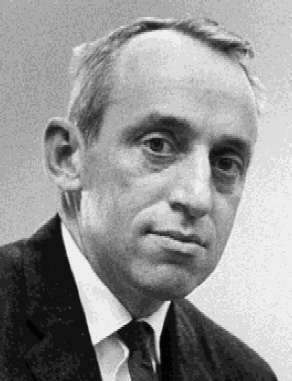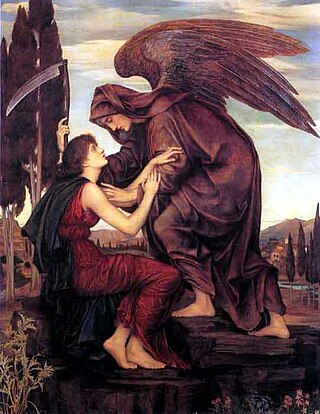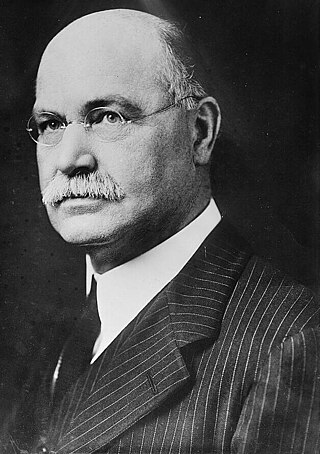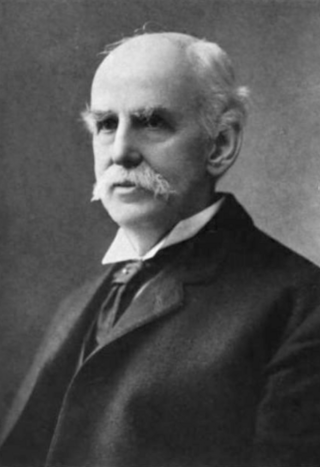Related Research Articles

James Tobin was an American economist who served on the Council of Economic Advisers and consulted with the Board of Governors of the Federal Reserve System, and taught at Harvard and Yale Universities. He contributed to the development of key ideas in the Keynesian economics of his generation and advocated government intervention in particular to stabilize output and avoid recessions. His academic work included pioneering contributions to the study of investment, monetary and fiscal policy and financial markets. He also proposed an econometric model for censored dependent variables, the well-known tobit model.

Samael is an archangel in Talmudic and post-Talmudic tradition; a figure who is the accuser or adversary, seducer, and destroying angel.

Charles Francis Adams Jr. was an American author, historian, and railroad and park commissioner who served as the president of the Union Pacific Railroad from 1884 to 1890. He served as a colonel in the Union Army during the American Civil War. After the war, he was a railroad regulator and executive, an author of historical works, and a member of the Massachusetts Park Commission.

Jeremy Belknap was an American clergyman and historian. His great achievement was the History of New Hampshire, published in three volumes between 1784 and 1792. This work is the first modern history written by an American, embodying a new rigor in research, annotation, and reporting.

Frank William Taussig (1859–1940) was an American economist who is credited with creating the foundations of modern trade theory.

James Schouler was an American lawyer and historian best known for his historical work History of the United States under the Constitution, 1789–1865.
Clarence Crane Brinton was an American historian of France, as well as a historian of ideas. His most famous work, The Anatomy of Revolution (1938) likened the dynamics of revolutionary movements to the progress of fever.

Laurel Thatcher Ulrich is a Pulitzer Prize-winning American historian specializing in early America and the history of women, and a professor at Harvard University. Her approach to history has been described as a tribute to "the silent work of ordinary people". Ulrich has also been a MacArthur Genius Grant recipient. Her most famous book, A Midwife’s Tale, was later the basis for a PBS documentary film.

Edward Perkins Channing was an American historian and an author of a monumental History of the United States in six volumes, for which he won the 1926 Pulitzer Prize for History. His thorough research in printed sources and judicious judgments made the book a standard reference for scholars for decades. Channing taught at Harvard 1883–1929 and trained many PhD's who became professors at major universities.
Spencer Phips was a government official in the Province of Massachusetts Bay. Born Spencer Bennett, he was adopted by Massachusetts Governor Sir William Phips, his uncle by marriage, whose name he legally took. Phips served for many years in the provincial assembly, and on the governor's council, before receiving an appointment as lieutenant governor in 1732, a post he held until his death. He was twice formally acting governor.
Miloš Milorad Velimirović was an American musicologist. Twice a recipient of a Fulbright fellowship, he was considered an international expert in the areas of Byzantine music, the history of Slavonic music, and the history of Italian opera in the 18th century.

Clarence H. Miller born in Kansas City, Missouri was an American professor emeritus of English at Saint Louis University. He is best known for major contributions to the study of Renaissance literature, and creating the classic translations from Latin of Saint Thomas More's 1516 book Utopia, and Erasmus's 1509 The Praise of Folly. Utopia is considered one of the most important works of European humanism. Miller was also Executive Editor of the Yale University Thomas More variorum project, which produced, over a period of decades, the 15-volume Yale Edition of the Complete Works of St. Thomas More.

Thomas Nixon Carver was an American economics professor.
Events from the year 1798 in the United States.

The Memorial to Robert Gould Shaw and the Massachusetts Fifty-Fourth Regiment is a bronze relief sculpture by Augustus Saint-Gaudens opposite 24 Beacon Street, Boston. It depicts Colonel Robert Gould Shaw leading members of the 54th Regiment Massachusetts Volunteer Infantry as it marched down Beacon Street on May 28, 1863 to depart the city to fight in the South. The sculpture was unveiled on May 31, 1897. This is the first civic monument to pay homage to the heroism of African American soldiers.

Charles Franklin Dunbar was an American economist. He held the first Chair of Political Economy at the Harvard University in 1871.
The "Commemoration Ode" is an 1865 poem by James Russell Lowell. It was written for Harvard's Commemoration Day. Though the Ode received a lackluster reception when Lowell first delivered it on July 21, 1865, after it was republished later that year it gained a more positive reputation. By the 1870s the poem was very highly thought of, an opinion which gradually shifted in the mid-20th century, and it has since been less popular or praised.
Liu Kwang-ching, who sometimes published under the name K.C. Liu, was a Chinese-born American historian of China. He taught at University of California-Davis from 1963 until his retirement in 1993. He is best known for his scholarship in late-Qing history, astute bibliographical work, and edited volumes, including co-editing Cambridge History of China volumes.

Bibliography of early American publishers and printers is a selection of books, journals and other sigmass devoted to these topics covering their careers and other activities before, during and after the American Revolution. Various works that are not primarily devoted to those topics, but whose content devotes itself to them in significant measure, are sometimes included here also. Works about Benjamin Franklin, a famous printer and publisher, among other things, are too numerous to list in this bibliography, can be found at Bibliography of Benjamin Franklin, and are generally not included here unless they are intensely devoted to Franklin's printing career. Single accounts of printers and publishers that occur in encyclopedia articles are not included here.
Henry Marvin Belden (1865-1954) was an American Folklorist and pioneer collector of folksongs and ballads from Missouri.
References
- ↑ Bail, H. V. (1942). Harvard’s Commemoration Day July 21, 1865. The New England Quarterly, 15(2), 256–279. https://doi.org/10.2307/360526
- ↑ Bail, H. V. (1942). Harvard’s Commemoration Day July 21, 1865. The New England Quarterly, 15(2), 257. https://doi.org/10.2307/360526
- ↑ Bail, H. V. (1942). Harvard’s Commemoration Day July 21, 1865. The New England Quarterly, 15(2), 256–257. https://doi.org/10.2307/360526
- ↑ Bail, H. V. (1942). Harvard’s Commemoration Day July 21, 1865. The New England Quarterly, 15(2), 257. https://doi.org/10.2307/360526
- ↑ Bail, H. V. (1942). Harvard’s Commemoration Day July 21, 1865. The New England Quarterly, 15(2), 257. https://doi.org/10.2307/360526
- ↑ Bail, H. V. (1942). Harvard’s Commemoration Day July 21, 1865. The New England Quarterly, 15(2), 264. https://doi.org/10.2307/360526
- ↑ Bail, H. V. (1942). Harvard’s Commemoration Day July 21, 1865. The New England Quarterly, 15(2), 265. https://doi.org/10.2307/360526
- ↑ Bail, H. V. (1942). Harvard’s Commemoration Day July 21, 1865. The New England Quarterly, 15(2), 264. https://doi.org/10.2307/360526